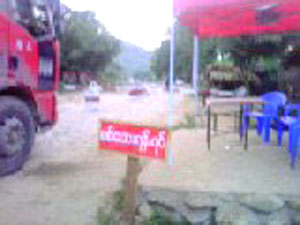The Burmese military junta has banned all cross border trade between China and the Kachin Independence Army (KIA), in Kachin State, Northern Burma, after Burmese troops suffered casualties caused by KIA mines on November 22...
The Burmese military junta has banned all cross border trade between China and the Kachin Independence Army (KIA), in Kachin State, Northern Burma, after Burmese troops suffered casualties caused by KIA mines on November 22.
 The ban was imposed today at 6 a.m. local time, by an order of the Burmese military leaders in Naypyitaw, Burma’s capital; three days after KIA mines killed one Burmese soldier and injured two, according to KIA officials.
The ban was imposed today at 6 a.m. local time, by an order of the Burmese military leaders in Naypyitaw, Burma’s capital; three days after KIA mines killed one Burmese soldier and injured two, according to KIA officials.
No time frame for lifting the ban has been announced.
KIA officials, on condition of anonymity, confirmed to the Kachin News Group that KIA security mines killed and injured the Burmese soldiers when they tried to enter the KIA’s restricted zone between the Nahpaw Bum and Hpalap Bum mountains, in eastern Kachin State.
Burmese Army bases are located in Nahpaw Bum, formerly the headquarters of the KIA. Hpalap Bum is the KIA divisional command.
The dead and injured Burmese soldiers are from Light Infantry Battalion No. 321, led by Lt-Col Hla Htun, based in Shwe Nyaung Pyin village, in Waingmaw Township. They were sent to Nahpaw Bum as part of a regular troop rotation by the Burmese Army, according to KIA sources.
A high ranking Burmese military officer from the Myitkyina-based Northern Regional Command is scheduled to visit the spot today, said sources close to the local army unit.
No Chinese or Burmese exports or imports have been authorized to cross the border at the Lajayang Checkpoint, on Myitkyina-Manmaw (Bhamo) Road, in southeastern Kachin State, since early this morning, local traders said.
The checkpoint is located outside Laiza, the KIA headquarters, which is the main border trade corridor in Kachin State. The crossing of Burmese and Chinese people and trade goods are controlled at the checkpoint.
Hundreds of cars and trucks cross the checkpoint daily, and Chinese commodities are mainly transported to Myitkyina, Manmaw, and up to Mandalay, according to traders.
Chinese workers and businessmen are not allowed to enter Burma at the checkpoint as of today. However, they are allowed to cross back into China, said local merchants.
There has been no communication between the KIA and the junta since the government labeled the armed ethnic group as “insurgents” or “enemies” on September 1, following the KIA’s rejection of an order to transform into the Border Guard Force, under the control of the Burmese Army, KIA officials said.
On November 20, the KIA ordered the closure of all branch liaison offices in Burma by today, November 25, except offices in Myitkyina, the capital of Kachin State, after receiving a warning last week from Lt-Col Thet Pung, Chief of Military Affairs Security (MAS), in Myitkyina, Northern Regional Command.
Local military analysts said it is not likely civil war will break out immediately between the KIA and the Burmese military because of the incident.
Local border merchants said today’s ban on border trade will impact both sides equally, because the two parties rely on business linked to Chinese imports and investments.



